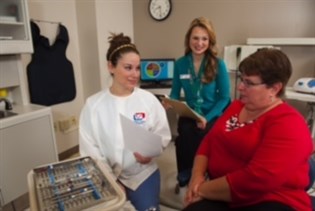Emily Holt is a Clinical Associate Professor of Dental Hygiene/Assisting. She has been with USI since 2001, incorporating service learning courses within her curriculum. She also teaches a certificate program on local anesthesia for practicing dental hygienists through USI. Her current research interests include interprofessional education collaboration between dental hygiene and nursing students as well as dental hygiene and dietetics students. She has also researched dental hygiene students working with individuals in addiction recovery programs.
Clinical Application of Periodontology (DTHY 422) allows senior dental hygiene students to provide non-surgical periodontal treatment to patients with moderate to severe periodontitis over the course of seven Fridays. Twelve patients receive free care throughout the semester, many of whom cannot afford the costs of treatment without the help of this free clinic. Treatment is completed over four appointments after assessment findings and treatment plans are completed. A reevaluation appointment follows approximately six weeks after the last treatment appointment, to allow sufficient time for the tissues to heal. Dental hygiene students learn about non-surgical periodontal debridement, work closely with faculty for guidance, experience adjunctive methods of treatment for periodontitis, and provide a reevaluation to determine the success of the treatment.
 Interprofessional education is another important component within the course. Different medical professions can help students view a more holistic approach of the client, not just the physical, primary problem. The interprofessional team consists of two dental hygiene students and one to two dietetics students per client. Dietetics students were the chosen interprofessional partner for this course since their knowledge in nutritional assessment, intervention, and counseling is superior to that of the dental hygiene students. The interprofessional team provides extensive nutritional counseling for the client that individualized based on medical conditions and oral infection. The patients treated in this
Interprofessional education is another important component within the course. Different medical professions can help students view a more holistic approach of the client, not just the physical, primary problem. The interprofessional team consists of two dental hygiene students and one to two dietetics students per client. Dietetics students were the chosen interprofessional partner for this course since their knowledge in nutritional assessment, intervention, and counseling is superior to that of the dental hygiene students. The interprofessional team provides extensive nutritional counseling for the client that individualized based on medical conditions and oral infection. The patients treated in this
course have great need for proper nutrition to allow for adequate healing of the soft tissues following therapy, as well as individualized recommendations for medical conditions. It is common to treat patients with hypertension or type II diabetes mellitus in this clinical course. Patients with diabetes express gratitude as they now have better control over their blood sugar levels thanks to a healthy mouth. Diabetics also learn the importance of health and nutrition, grasping a better understanding of what they are eating and how it affects their entire body including the health of their mouths. Following completion of the interprofessional activity, dental hygiene students feel confident recommending foods and modifying patients’ general health, not just on oral health.
Mrs. Holt incorporates a reflective component into her clinical course. Students reflect on progress, aspects making a difference within the clinic, assessing their client, and re-evaluating their client. One tool to gather all reflective statements in this course is a critical thinking worksheet. This worksheet is modified during all appointments to accurately reflect the client’s needs and to draw connections for critical thinking. Students present over their client and overall experience during the subsequent semester in DTHY 451.
This course has helped Mrs. Holt view students in a different manner. She does not just grade students, she spends time with them as they mature and realize the value of understanding the “why?” factor. They can collaborate, suggest different techniques to try, and reflect on why a specific method did or did not work with a patient. She sees herself as a reflective educator and incorporates reflection into her preparation for all courses.


